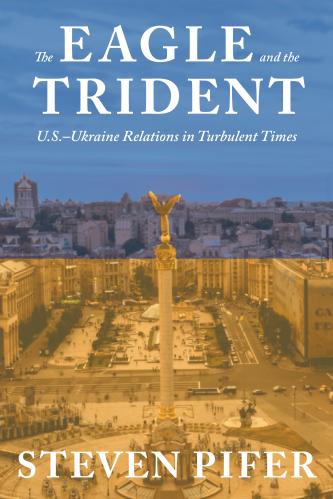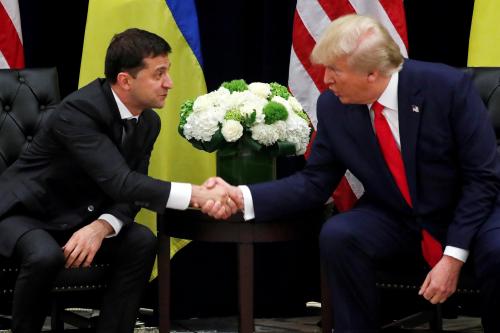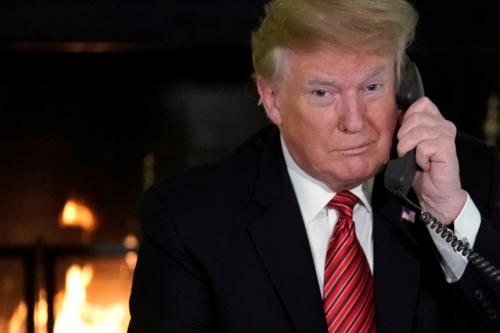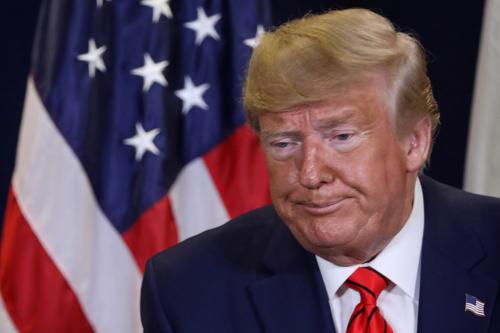Steven Pifer’s takeaways from what we’ve learned about President Trump’s approach to Ukraine’s Zelenskiy administration through the White House record of a presidential phone call, a whistleblower’s complaint to Congress, and diplomats’ published text messages. This piece originally appeared on FSI Stanford’s Medium.
Over the past two weeks, a CIA whistleblower’s complaint, a White House record of a July 25 telephone conversation between President Donald Trump and Ukrainian President Volodymyr Zelenskiy, and texts exchanged by American diplomats have dominated the news and raised questions about the president’s handling of policy toward Ukraine. Here are five observations:
First, President Trump was not doing the nation’s business on July 25. Trump has described the call as “perfect,” but the memorandum of conversation shows that he did not seek to advance U.S. interests. He did not ask Zelenskiy about progress in ending Russia’s war against Ukraine. He did not propose steps to facilitate more American trade. He did not raise how U.S. liquified natural gas might strengthen Ukraine’s energy security (something of interest to Secretary of Energy Rick Perry, whom Trump now says instigated a call that he did not want to make).
Instead, Trump posed two requests to his Ukrainian counterpart: check CrowdStrike (even though nothing suggests a Ukrainian link to the company that examined the Democratic National Committee’s servers in 2016), and investigate a thoroughly-debunked charge that Vice President Joe Biden sought to have a Ukrainian prosecutor general fired to protect his son, Hunter Biden. Neither ask advances U.S. national goals. Both are about Trump’s personal interest in undermining his potential Democratic rival in 2020.
Second, the president sounds poorly briefed on Ukraine. The fact that Trump did not raise any issues of interest to the United States — as opposed to issues of personal interest — suggests he took no briefing from National Security Council staff before the call. He raised discredited stories similar to those that his lawyer, Rudy Giuliani, has been peddling for months on cable news. Giuliani seems to have received much of his information, including his claim about the Bidens, from a former Ukrainian prosecutor general who held a grudge against the U.S. embassy in Kyiv — and who has since recanted or denied most of the stories he fed Giuliani.
Third, there was a quid pro quo. The president claims there was no quid pro quo in his call to Zelenskiy. From texts released late on October 3, however, senior U.S. diplomats believed there was. Consider the following text exchanges:
- July 25 text from Ambassador Kurt Volker (U.S. special envoy on Ukraine) to Zelenskiy aide Andrey Yermak (just prior to the Trump-Zelenskiy call): “Heard from White House — assuming President Z convinces trump he will investigate/‘get to the bottom of what happened’ in 2016, we will nail down date for visit to Washington.”
- August 9 text from Ambassador Gordon Sondland (U.S. representative to the European Union) to Volker: “To avoid misunderstandings, might be useful to ask Andrey [Yermak] for a draft statement (embargoed) so that we can see exactly what they propose to cover.”
- From August 13 text from Volker to Sondland describing possible Ukrainian statement: “Special attention should be paid to the problem of interference in the political processes of the United States especially with the alleged involvement of some Ukrainian politicians. I [Zelenskiy] want to declare that this is unacceptable. We intend to initiate and complete a transparent and unbiased investigation of all available facts and episodes, including those involving Burisma [the company on whose board Hunter Biden sat] and 2016 U.S. elections, which in turn will prevent the resurgence of this problem in the future.”
- August 13 text from Sondland in response to above Volker text: “Perfect.”
In his statement to the House Committees on Intelligence, Oversight and Reform, and Foreign Affairs on October 3, Volker said that he and Sondland talked with Giuliani on August 16. In that conversation, Giuliani had noted that a more generic anti-corruption statement offered by the Ukrainians was insufficient and should specifically mention Burisma and 2016.
Ambassador William “Bill” Taylor, U.S. ambassador to Ukraine from 2006–2009 and currently the charge d’ affairs in Kyiv, was clearly uncomfortable with all this:
- September 1 text from Taylor to Sondland: “Are we now saying that security assistance and WH meeting are conditioned on investigations?”
- September 9 text from Taylor to Sondland: “As I said on the phone, I think it’s crazy to hold security assistance for help with a political campaign.”
It is hard to read these texts and conclude that there was no quid pro quo. To his great credit, Taylor questioned the very idea and in a separate text even suggested that he would resign (full disclosure: Taylor is a former colleague and good friend whom I admire).
In his defense, Trump has pointed to Sondland’s response to Taylor’s “it’s crazy” text:
- September 9 text from Sondland to Taylor: “Bill, I believe you are incorrect about President Trump’s intentions. The President has been crystal clear no quid pro quos of any kind.”
However, the president and his supporters at “Fox and Friends” fail to note that well over four hours passed before Sondland sent his rather formal reply to Taylor, raising a question about whether he might have consulted with anyone. Moreover, Sondland’s message went on to suggest “we stop the back and forth by text” — just what one might do if one did not want written records that later could be turned over to, say, the House Committees on Intelligence, Oversight and Reform, and Foreign Affairs.
In early June, Trump sent an invitation to Zelenskiy to visit the United States, yet nearly two months later, no date had been fixed for the visit. The text messages show Volker and Sondland in late July and August discussing what the Ukrainian president would say about launching investigations as a prerequisite for getting a specific date to meet with Trump. A visit to the United States, as for his predecessors, would be a big deal for the newly-elected Zelenskiy, playing well with his domestic audience and sending Moscow a helpful signal of U.S. support for Ukraine. (In the end, Zelenskiy only got a meeting in New York on the margins of the UN General Assembly, not a visit to Washington where, in addition to an Oval Office session, he could have met Congressional leaders.)
The president put a hold on $391 million in Congressionally-approved security assistance for Ukraine prior to the July 25 phone call. It was only at the beginning of September when the texts suggest that security assistance had also been held pending the kind of Ukrainian statement sought by Trump and Giuliani.
Fourth, Sondland’s role is curious. Sondland, a political appointee who arranged donations of $1 million to Trump’s inaugural committee, is the U.S. representative to the European Union based in Brussels. While one aspect of his job is coordinating with EU officials on Western policy toward Ukraine, that is only part of a very broad U.S.-EU agenda. Yet Sondland visited Ukraine three times between February and July, hosted Zelenskiy at a dinner in Brussels in June, and traveled to New York to take part in the September 25 Trump-Zelenskiy meeting. He also reportedly spent considerable time in Washington where he often called on the White House.
The degree of Sondland’s involvement on Ukraine is extraordinary, especially as the United States had experienced diplomats on the ground in Kyiv and a special envoy dedicated to resolving the Russia-Ukraine conflict. When I served as ambassador to Ukraine, the U.S. representative to the European Union came to Kyiv just once in three years — and specifically at my request to talk to Ukrainians about how they might better engage with the European Union.
Fifth, Ukraine has to navigate a risky situation. All this places Ukraine in a difficult position. Zelenskiy understandably wants a good relationship with Trump, as shown by the obsequious comments he made during the July 25 telephone conversation. Such a relationship bolsters his domestic standing and position vis-à-vis Moscow. On the other hand, Zelenskiy presumably understands the danger of becoming the football in U.S. domestic politics that Giuliani seeks to make it. Since regaining independence in 1991, Ukraine has enjoyed a remarkable degree of bipartisan support in Congress. A wrong misstep in Kyiv would put that at risk.
On October 4, the new Ukrainian Prosecutor General, Ruslan Riaboshapka, announced that his office would conduct a general review of cases closed by his predecessor, including some involving Mykola Zlochevskiy, the owner of Burisma, though it is not clear whether Burisma would be subject of the review. Riaboshapka, who has a good reputation with Ukrainian civil society activists, stated “the key word [in this review] is neither Biden nor Burisma.” He added that he had no information suggesting that Hunter Biden had done anything wrong. He appears to be trying to walk a very fine line.
This is a sorry mess. The domestic debate in the United States threatens to overwhelm all things between Washington and Kyiv. It will not be easy, but U.S. officials hopefully can maintain focus on the U.S. interest in helping to foster a stable, independent and democratic Ukraine with a growing market economy and increasing links to the West. That is not the focus of the current American president, but it reflects the view of each of his predecessors and their administrations going back to the early 1990s.








Commentary
Five observations on President Trump’s handling of Ukraine policy
October 7, 2019